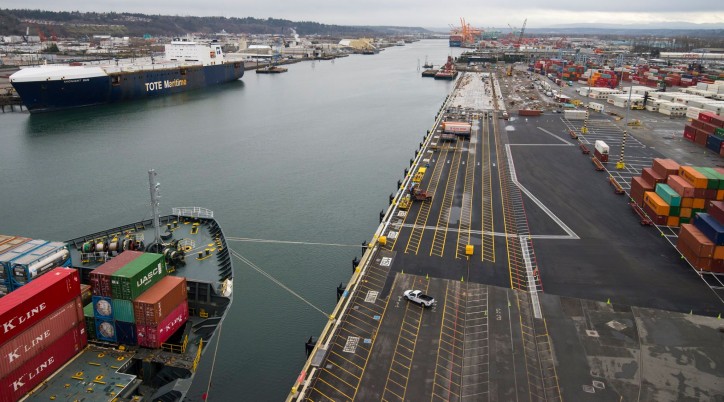The Northwest Seaport Alliance, a joint venture between the ports of Tacoma and Seattle that operates the fourth-largest maritime shipping gateway in North America, raised concerns that new tariffs on imported steel and aluminum could lead to broad negative economic consequences for Washington state.

Steel and aluminum imports through the NWSA and Seattle-Tacoma International Airport, operated by the Port of Seattle, exceeded $2.5 billion in value in 2017. Those imports either go directly to Washington-based manufacturers or are processed through logistics services and routed to other destinations in the United States.
“Higher tariffs will jeopardize jobs in Washington and raise costs for consumers in a much wider range of industries,” said Courtney Gregoire, Port of Seattle commission president and co-chair of the NWSA. “We support vigorous enforcement of fair trade laws and a level playing field, but this reckless approach puts too many people and industries in the economic crosshairs.”
“Just as concerning as these blanket tariffs is the potential for retaliatory tariffs on exports of Washington agricultural and manufactured goods,” added Don Meyer, Port of Tacoma commission president and NWSA co-chair. “As a state in which 40 percent of our jobs are tied to international trade, we are risking jobs and quality of life by levying blanket tariffs against some of our most important trading partners and opening the door to their retaliation.”
Many trade experts also are raising concerns that new U.S. tariffs on imports could lead to retaliatory tariffs on U.S. exports. The NWSA is the second-largest export gateway for overall agricultural and forest products in the U.S. The value of those exports added up to more than $6.8 billion in 2016, making up 76 percent of NWSA containerized exports.
“Washington farmers export 80 to 90 percent of their wheat, and so we are deeply reliant on foreign markets to ensure the success of our state’s growers," said Mike Miller, former chair of the Washington Grain Commission and current chairman of the U.S. Wheat Associates. “Our product is an easy target for retaliatory tariffs, which not only have the potential to reduce sales to overseas partners, but also disrupt long-term relationships that have taken years to cultivate.”
2017 Iron or Steel Imports
- The NWSA imported $1,878,245,129 worth of iron or steel.
- Sea-Tac Airport imported an additional $16,469,495 in iron or steel.
2017 Aluminum Imports
- The NWSA imported $557,234,253 in aluminum.
- Sea-Tac Airport imported $6,064,945 worth of aluminum.
While the exact potential for retaliatory tariffs from impacted trading partners is unclear, major steel and aluminum importers are also significant Washington trading partners. For example, Canada, Mexico, China and the European Union account for 50 percent of the destinations for exports through the Port of Seattle seaport, 45 percent through Sea-Tac and 37 percent of the destinations through the Port of Tacoma.
Source: NWSA